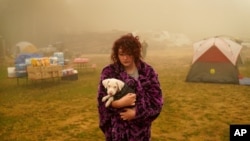Wildfires continued to rage across large swaths of the Western U.S. on Sunday, with massive clouds of smoke enveloping the region and endangering the health of millions of residents.
Air quality across the Pacific Northwest state of Oregon was characterized by state environmental officials as “hazardous” or “very unhealthy.” Dense smoke warnings were posted in Oregon and the neighboring state of Washington by the National Weather Service.
In all, throughout the Western U.S., there were 24 fires in California, 15 in Washington, 14 in Oregon, 12 in Idaho and others in Alaska, Arizona, Colorado, Nevada, New Mexico, Utah and Wyoming.
The blazes have killed at least 10 people in Oregon, with emergency workers expecting the death toll to increase. Some people in Portland, the state’s largest city, and elsewhere were fighting for breath as smoke filled the air. The fires have ravaged more than 400,000 hectares of land in the state.
In California, where the fires started sooner, at least 22 have died and about 1.3 million hectares charred. In the state of Washington, 269,000 hectares of land have burned.
Officials throughout the region urged residents to stay indoors unless necessary.
Visibility was less than a half kilometer in some places, according to the National Weather Service, making it dangerous to drive.
U.S. President Doanld Trump has largely avoided commenting on the wildfires, but he plans on visiting California on Monday for an update on the blazes, some of the worst in years.
After days of hot, windy weather, on Saturday the winds calmed and shifted to the west, bringing cooler, more moist weather from the ocean to help firefighters. But the air quality remained hazardous.
In Salem, the state capital of Oregon, the air quality index reading was 512 on Saturday morning, according to the U.S. Environmental Protection Agency’s AirNow site. The scale tops out at 500. Anything above 200 is considered “very unhealthy,” and anything above 300 is deemed “hazardous.”
In Paradise, California, a city devasted by wildfire in 2018, the reading was 592, according to the PurpleAir monitoring site.
"Above 500 is literally off the charts," said Laura Gleim, a spokesperson for the Oregon Department of Environmental Quality.






